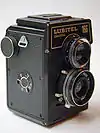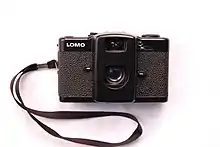LOMO
LOMO (Russian: Ленинградское Oптико-Mеханическое Oбъединение, romanized: Leningradskoye Optiko-Mekhanicheskoye Obyedinenie, lit. 'Leningrad Optical Mechanical Association') is a manufacturer of medical and motion-picture lenses and equipment based in St. Petersburg, Russia. The company was awarded three Order of Lenin decorations by the Soviet Union.
 | |
Native name | ЛОМО |
|---|---|
| Industry | Imaging, Medical |
| Founded | Petrograd, Russia (1914) |
| Headquarters | St. Petersburg, Russia |
| Products | Lenses, medical equipment, consumer still and movie cameras, lenses, professional sound recorders for motion-picture production |
| Revenue | $56.1 million[1] (2017) |
| $8.82 million[1] (2017) | |
| -$5.82 million[1] (2017) | |
| Total assets | $237 million[1] (2017) |
| Total equity | $26.2 million[1] (2017) |
| Website | lomo.ru/english
www |
Its Lomo LC-A consumer camera was the inspiration for the lomography photographic movement.
History

The company was founded in 1914 in Petrograd (now Saint Petersburg).
It was established as a French – Russian limited company to produce lenses and cameras. It manufactured gun sights during World War I. In 1919, it was nationalised. In the ensuing years, the state optical industries were reorganised several times. In 1921, the factory was named the Factory of State Optics, G.O.Z. In 1925, camera production was resumed, and several lens designs tested between 1925 and 1929. In 1928, the factory was ordered to manufacture a 9x12 camera, known as the FOTOKOR.
Further reorganisations of the Soviet optical factories in several stages finally resulted in that the factory at Leningrad became GOMZ, the Russian Optical and Mechanical Factory.
In the transition period 1932 to 1935 a copy of the Leica camera was developed, the VOOMP I. It was followed by the VOOMP II or the "Pioneer" that was manufactured in small numbers. Simultaneously designers began the development of a single-lens reflex camera for 35mm cine film, possibly inspired by similar work in Germany, especially at Zeiss Ikon in Dresden, since the lens mount is quite similar to that of the Contax cameras of the time. Zeiss themselves were not allowed to pursue their ideas, due to the German armament. The new camera, called the "Sport", was introduced at about the same time as the Ihagee Kine Exakta in 1936.
Today LOMO makes military optics, scientific research instruments, criminological microscopes, medical equipment, and a range of consumer products. It produced the first Russian camera in 1930.
Known as GOMZ (State Optical-Mechanical Plant), the company was transformed under the direction of Mikhail Panfilov, who united several industries and founded the LOMO Association in 1962. Panfilov was the General Director until 1984, when he retired and was replaced by Georgy Khizha as Director General. In 1990 - 1997 Ilya Klebanov was the Director General of LOMO Association.
Amateur movie equipment brands were LOMO and AVRORA for cameras and Russ for projectors. Ritm is also used after LOMO for professional sound equipment. It produced the one and only Super 8 sound camera and projector in the USSR. It was also the main Soviet producer for professional grade cine lenses, including anamorphic lenses.
The company went public in 1993, and was renamed LOMO PLC; it is traded on the RTS Classic Stock Market.
The company is ISO 9001 certified and exports worldwide. Night-vision devices and telescopes account for 30% of the company's exports. Germany is the largest importer of LOMO products. Medical equipment, fiber optic cables and Endoscopes, optical components and cameras are consumed mainly by the Russian market and other states of the former Soviet Union. Military equipment and science research instruments make a significant share of production for export to such countries as Israel, India, United States, Canada, Mexico, and other international markets.
Its Maksutov telescope range is highly regarded by amateur astronomers.
The word LOMO is often used to refer to the Lomo LC-A and other LOMO branded consumer cameras; while the cameras have a large following around the world, the cameras themselves are a minor product for LOMO PLC.
LOMO is also currently a manufacturer of die-cast models in 1:43 scale. LOMO factory mass-produces 1:43 scale models of the 1930s-1950s vehicles on AMO, ZiS, ZiL and GAZ chassis.
Social standing
LOMO is regarded in St. Petersburg for its advanced medical centre, with well equipped facilities for advanced treatment of a range of medical conditions. LOMO medical centre has a steady reputation in general surgery and trauma, oncology and radiology, OB/GYN, pediatrics, physical therapy and other specialties of medicine.
Medical instruments, such as Endoscopes and Surgical Microscopes made by LOMO are used by the doctors at LOMO medical centre, thus providing prompt feedback from doctors to engineers and designers of medical equipment.
References
- "Годовая бухгалтерская отчетность". Retrieved 1 November 2018.
External links
| Wikimedia Commons has media related to LOMO. |
- Official website
- LOMO America, Inc.
- USSRPhoto.com Wiki catalog of LOMO manufactured cameras. (See GOMZ/LOMO sections)
- Dowling, Stephen (2012-11-21). "Did the Lomo camera save film photography?". BBC News Online. Retrieved 2012-11-21.
